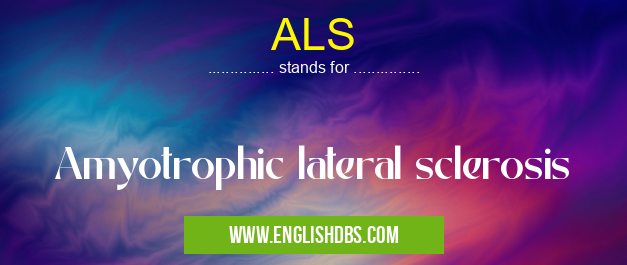What does ALS mean in HUMAN GENOME
Amyotrophic Lateral Sclerosis (ALS) is a life-threatening neurological disorder that affects the nerve cells responsible for controlling voluntary muscle movement. This degenerative disease causes progressive death of nerve cells and results in paralysis. As the disease progresses, it can lead to difficulty with walking, talking, breathing, swallowing, and eventually even death.

ALS meaning in Human Genome in Medical
ALS mostly used in an acronym Human Genome in Category Medical that means Amyotrophic lateral sclerosis
Shorthand: ALS,
Full Form: Amyotrophic lateral sclerosis
For more information of "Amyotrophic lateral sclerosis", see the section below.
» Medical » Human Genome
Essential Questions and Answers on Amyotrophic lateral sclerosis in "MEDICAL»GENOME"
What are the symptoms of ALS?
Common symptoms of ALS include restricted movement in arms and legs, weakness in muscles, twitching or cramping of muscles, loss of speech or difficulty speaking and swallowing, and difficulty with writing or manipulating objects.
How does ALS progress?
The progression rate of ALS varies widely between individuals. In general, this neurodegenerative disorder gradually worsens over time as nerve cells responsible for controlling voluntary muscle movement die off. Eventually mobility becomes severely impaired or lost completely due to paralysis.
Is ALS hereditary?
For approximately 10% of cases, ALS is believed to be caused by a genetic mutation that can be inherited from family members. In other cases there may be no known cause for the disease.
What treatments are available for people with ALS?
Currently there is no known cure for genetic forms of ALS; however treatments such as physical therapy and medications help improve quality of life and prolong survival by slowing down the progression of the disease. Additionally a wide range of assistive devices such as wheelchairs are available to help people with mobility impairments caused by ALS.
Does nutritional therapy help people with ALS?
Eating nutritious foods can help maintain physical strength which may assist people with daily activities; however there is not enough reliable evidence at this time to say whether nutritional therapy improves long-term outcomes among people living with this condition.
Final Words:
Amyotrophic lateral sclerosis (ALS) is a progressive neurodegenerative disorder characterized by restricted movement in arms and legs; weakness in muscles; twitching or cramping; impairments in speech, writing or manipulation; shortened lifespan; and variable progression rates across individuals. While there is currently no cure for most forms, treatments such as physical therapy and medications have been effective in slowing down its progression as well as improving quality of life for those affected by it.
ALS also stands for: |
|
| All stands for ALS |
